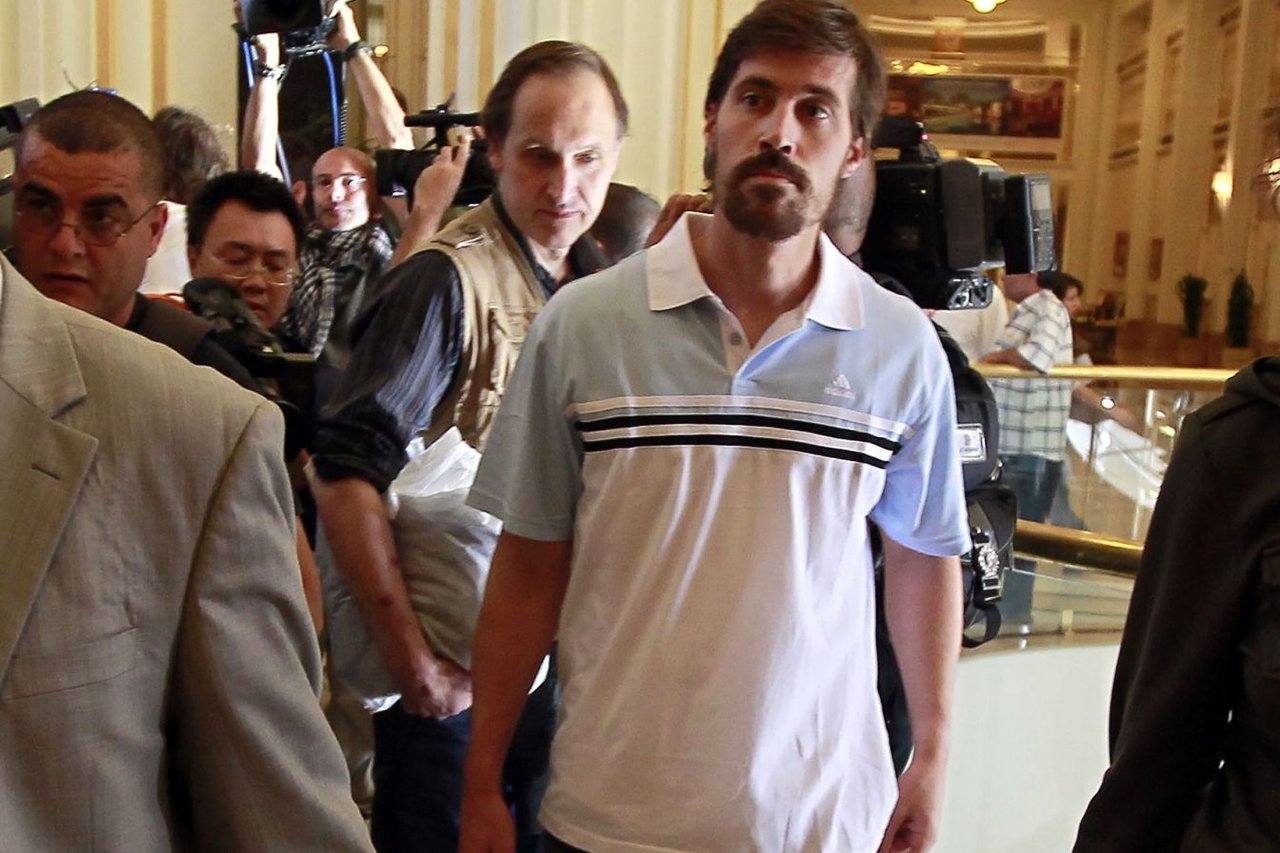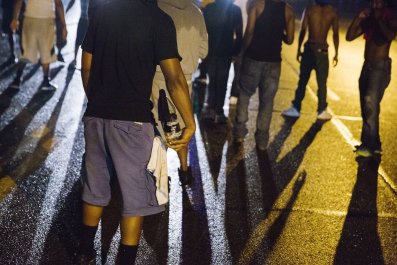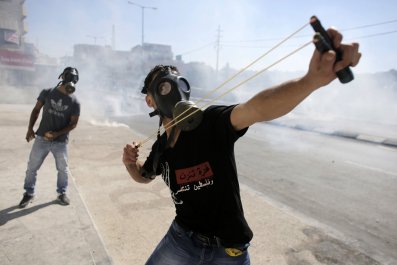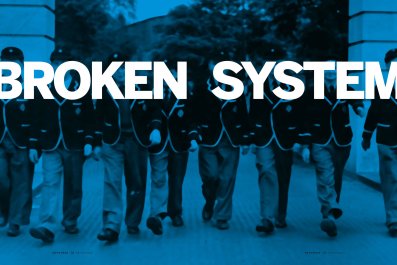Unlike in the movies, rescue missions rarely succeed. For every legendary success, like the Israeli commandos who rescued 102 hostages at Entebbe in Uganda in 1976, many more rescue missions fail. There was the infamous failed attempt to rescue U.S. hostage in Iran in 1980, and years before that in North Vietnam, a Special Forces raid on the long deserted POW camp at Son Tay, to name just a few. Last year, a French commando died in a failed rescue mission in Somalia. For every Captain Phillips, there are many disasters.
It's a high-risk gambit undertaken by brave troops who understand they may never return. And President Obama was right and courageous to try to rescue James Foley and other hostages. But many spy agency insiders say a decline in basic military intelligence gathering over the years makes rescue missions even harder. The Pentagon has recently fielded a fledgling new spy service, the Defense Clandestine Service, that will supposedly fill at least some of those holes.
"Military intelligence," goes an outdated old saw, "is an oxymoron." It's been mocked as the slow-witted sibling to the supposedly more glamorous CIA. But dispatching spies to suss out enemy territory is as old as the Bible, and has played a critical role in American victories since the Revolutionary War.
The problem today, say many critics, is that the DIA, as well as the CIA, isn't doing one of its key jobs: recruiting low-level foreign agents to collect granular information on the location, movements, weapons and--especially--intentions of enemy forces, such as the Islamic State fighters who held James Foley. Instead, critics say, the DIA has for years been trying to mimic the CIA's focus on foreign leaders, terrorists and the proliferation of nuclear weapons.
What's more needed, critics say, are U.S. field operatives deployed to recruit sheep herders, camel merchants, gas smugglers and even car thieves, the kind of people who can eyeball and engage enemy fighters and pick up gossip on their plans.
"Nobody wants to collect that kind of stuff anymore," says a former Delta Force operative who works with the CIA, speaking on condition of anonymity, as he's not authorized to discuss such issues. "When you do, it's considered low-level, unimportant, and it's written off. Instead, we collect a lot of things that sound sexy but do nothing for us," such as chatter in Istanbul's souk about the prime minister of Turkey's inner circle. "The military," he added, "has all gravitated to trying to imitate JSOC [the Joint Special Operations Command] and wants to collect a lot of useless data on who they think might be terrorists. Nobody wants to do the basic blocking and tackling that's required to keep us prepared for events around the world."
A former CIA station chief who ran operations in places like Pakistan and Bosnia says, "My principal issue with the military is that they consistently do not do the basic tactical military intelligence collection job which is their sphere." Instead, he says, the Defense Intelligence Agency assigns colonels to recruit their opposite number in places like Tajikistan. "Defense attachés all want to be military diplomats and everybody else wants to do strategic-level stuff, but nobody is counting tanks. Jane's," he says, referring to the publisher of military data, "does a better job."
Recruiting spies in the badlands of the Middle East, South Asia and even eastern Ukraine is hard – and dangerous. For starters, U.S. intelligence has to get a well-trained case officer, as agent handlers are known, into the region to recruit an informant. It takes the CIA and military intelligence services at least six months to train a beginner in basic spy tradecraft. Often that's followed by several months or a year or more in language training. And then there's no guarantee he (or she) will ever build a reliable spy net in such murky terrains as Syria, Iraq or Pakistan.
Military intelligence has ceded that ground to the JSOC, critics say, and "technical means"-- spy satellites and NSA electronic eavesdropping. Mind-boggling as they are, however, such tools can be fooled by a wily opponent, like the communist guerrillas who dug vast tunnel networks right under U.S. units in Vietnam, or tunnel-digging Hamas fighters. Islamic State commanders, under assault by U.S. warplanes, will soon learn to dig in and stay off the grid, a retired U.S. general recently suggested.
Bottom line: There's no substitute for maintaining low-level spy networks in dangerous areas before they're needed for a rescue mission. "I think this is one of those things where the military has to constantly relearn its importance," says Philip Lohaus, a former Defense Department analyst who now studies future warfare strategy at the American Enterprise Institute in Washington, D.C. "In Iraq and Afghanistan," he says, "we did a relatively good job at HUMINT [human intelligence], collecting data, and having a good system for developing sources… But since that time, the HUMINT discipline within the military system seems, like a lot of things, to have contracted, but contracted in a way that doesn't seem smart, that doesn't seem to be strategic, in a sense that it doesn't maintain and build on skill sets that were battle-tested and proven."
Former CIA intelligence analyst Mark Stout says there's a mundane reason why worm-level spy work has gone the way of Walkmans and bell-bottoms. "The big thing is that you have do something particularly extraordinary to get promotions in the intel realm, and doing stuff like feeding the database is not going to cut it," he tells Newsweek.
"My last job at CIA was as a first line manager. And to get promoted...you had to have done something of personal interest to the president or vice president. Not that it just went to them, but something that the president or the vice president actually liked, cared about, issued feedback on, sent follow-up questions directly or indirectly back to you, that you then you had to do some more for him. That's what it took. Doing things for lower-level but still senior officials, maybe something that would help out in the field in Afghanistan, was [worth] a slap on the back, but that was about it."
But keeping constant human eyeballs on swift-moving insurgent groups is very tough, Stout quickly adds. "Those kinds of forces are extremely fluid in their organization, their membership and their location. So while we want to be paying attention, we shouldn't delude ourselves that we'll have such a good handle on such opponents anyway. In Vietnam, both military intelligence and the CIA put a great deal of time into understanding the Viet Cong and there were huge battles over what the information meant… The big picture is that counterinsurgency war is political. The important thing about understanding an irregular enemy is not knowing whether they've got 55,000 guys carrying rifles or 50,000, but where are they getting their momentum, are they getting their political message out, are they gaining or losing appeal, how are they interacting with the local population, whether they have foreign sponsors--that kind of thing. It isn't really subject to counting..."
Or a ladder to promotions. Strategic intelligence does, and nothing says "strategic" better than the Pentagon's new Defense Clandestine Service, an elite new corps designed to sprinkle the globe with undercover military case officers focused on long-term, big-picture targets like Chinese missiles, nuclear proliferation and terrorist kingpins. The DCS was created last year after intense turf battles with the CIA. According to a 2011 study issued by James Clapper, a former DIA chief himself who is the director of national intelligence, the focus on Iraq and Afghanistan created intelligence "gaps" elsewhere that only hundreds of new Pentagon spies could fill.
The Senate wasn't convinced. It stripped money from the enabling bill last year, saying the Pentagon "needs to demonstrate that it can improve the management of clandestine HUMINT" that it already has "before undertaking any further expansion." The House added a similar warning, saying it would withhold half the new spy service's 2014 cash until the Defense Department certified that the DCS was doing something "unique" that was needed. But as Defense News, a Washington insider publication put it, "Such certifications are not difficult tasks for the Defense Department… Barring a scandal or operational debacle, all evidence suggests DCS is a done deal."
One of its biggest champions is Undersecretary of Defense for Intelligence Michael G. Vickers, who wants to "model the DIA's training and overseas presence more closely" on the CIA, where he once worked, according to The Washington Post. Whether that will put more American-controlled eyeballs into the Islamic State is yet to be known.
Jeff Stein writes SpyTalk from Washington, DC. He was a military intelligence case officer in Vietnam.
A previous version of this article misstated the year of the rescue at Entebbe in Uganda. It was in 1976.






























